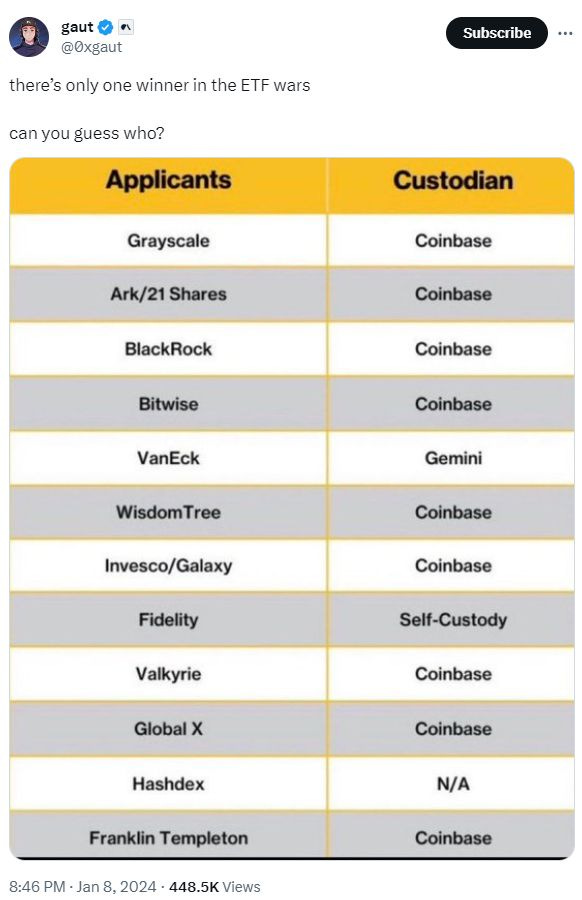Hi all,
and welcome to Bitcoin ETF mania 💩💩💩
So, Bitcoin ETF?
Btw…
And…
Let’s dive in!
What is Bitcoin ETF
A Bitcoin ETF, or Exchange-Traded Fund, is a type of investment fund that tracks the price of Bitcoin and is traded on traditional stock exchanges rather than cryptocurrency exchanges. It's designed to provide investors with a way to gain exposure to Bitcoin without having to directly purchase and store the cryptocurrency themselves.
For traditional investors, buying Bitcoin directly can be complex, involving setting up a cryptocurrency wallet, managing private keys, and understanding blockchain technology. A Bitcoin ETF simplifies this process, enabling investment through a familiar and regulated entity.
Also, ETFs are regulated financial products. This means that a Bitcoin ETF would come with certain protections and oversight not available in the largely unregulated world of cryptocurrencies. Additionally, investors don't need to worry about the technical challenges and security risks associated with handling and storing cryptocurrencies.
Bitcoin ETFs make it easier for a wider range of investors, especially those who are familiar with traditional stock markets but not with cryptocurrency markets, to invest in Bitcoin.
How does it all work?
From the Buyer's Perspective
Choosing a Platform:
To invest in a Bitcoin ETF, you typically use a brokerage account. Most major brokerage platforms that offer stock trading will also offer ETF trading.
You need to have an account with one of these brokers. If you don't already have one, you'll need to open and fund an account, which usually involves providing personal identification and linking a bank account.
Making the Investment:
Once your account is set up and funded, you can place an order to buy the Bitcoin ETF. Let’s say you want to invest $1000.
You would search for the ticker symbol of the Bitcoin ETF you wish to invest in.
You then place an order, specifying the amount ($1000) or the number of shares you want to buy. Orders can be 'market' (buy at current price) or 'limit' (buy at or below a specified price).
Order Execution:
The brokerage platform processes your order. If it’s a market order, it is usually executed fairly quickly during trading hours, at the current market price of the ETF shares.
Confirmation and Holding:
Once your order is executed, the shares of the Bitcoin ETF are credited to your brokerage account.
You can hold these shares, sell them, or buy more, just like with any other stock or ETF.
Behind the Scenes at the ETF Fund Level
Fund Management:
The ETF is managed by a fund manager or an investment company. They are responsible for the overall strategy and operation of the ETF.
Holding Bitcoin:
When a spot Bitcoin ETF receives investment (like your $1000), it doesn't always directly buy Bitcoin immediately with each individual investment.
Instead, the ETF periodically adjusts its holdings based on the overall inflow and outflow of funds to keep the ETF’s assets in line with the total value of shares held by investors.
Creation and Redemption of Shares:
ETF shares are created and redeemed in large blocks, known as 'creation units', by authorized participants (usually large institutional investors).
When there is high demand for the ETF, authorized participants may buy large amounts of Bitcoin to create more ETF shares, which are then sold to individual investors through the stock exchange.
Storage and Security:
The ETF fund is responsible for storing the Bitcoin it owns. This involves high-security measures, often including the use of cold storage (offline storage) to minimize the risk of theft or hacking.
The fund has custody solutions in place to manage and safeguard these Bitcoin holdings.
Tracking the Price of Bitcoin:
The ETF aims to closely track the price of Bitcoin. The fund manager adjusts the holdings as necessary to ensure the ETF's share price reflects the actual market price of Bitcoin.
Regulatory Compliance:
The fund operates under strict regulatory guidelines and must comply with various financial regulations to ensure transparency and protect investors.
This includes regular reporting and disclosures about the fund's holdings and performance.
Costs and Fees:
The ETF incurs various operational costs, including custody and security of the Bitcoin holdings, which are covered by management fees. These fees are deducted from the fund's assets, which can affect the overall return on your investment.
First day of trading
You could say that the first day of trading went just fine 💡
The new spot bitcoin exchange-traded funds drew $655 million of net inflows on their first day of trading, underscoring strong investor demand, according to Bloomberg data.
Measured by inflows, the top-performing fund was the Bitwise Bitcoin ETF, attracting $238 million. The fund’s backer had pledged that the fund would be jump-started with up to $200 million in seed capital, more than any of the other funds disclosed. It was followed by the Fidelity Wise Origin Bitcoin Fund, with $227 million in inflows, and the iShares Bitcoin Trust from BlackRock, with $112 million.
The real MVP
Of course like with everything in life there are winners and losers, and when it comes to Bitcoin ETF story there is one clear winner - Coinbase 💰💰💰
Bitcoin price now
So, did Bitcoin ETF “moved a needle” when it comes to Bitcoin price? 🤔
Source: Google finance
On January 10th Bitcoin price was $46k, but 7 days later it’s “only” $42k. One of the reasons for this is that the expectancy of Bitcoin ETF was already calculated in the price.
But, it doesn’t seem logical that after such a historic event Bitcoin price goes down, right?
Here is what a company called CryptoQuant has to say on that topic 👇
Bitcoin (BTC) is expected to correct to as low as $32,000 next month following the potential approval of a spot ETF, according to data provider CryptoQuant.
In what is being described as a potential "sell the news" event, CryptoQuant said in a note to CoinDesk that trader's unrealized profits are currently lingering at a level that historically precedes a correction.
In case you are wondering what “sell the news” is…
"Sell the news" is a well-known term in capital markets, it describes how asset prices, leverage and sentiment run up in the lead up to a bullish event only for prices to tumble shortly after.
This is because astute traders capitalize on the over-crowded long trade, trapping those with leverage and forcing them to close or get liquidated as price goes against them.
All we can say is…be careful 😉





